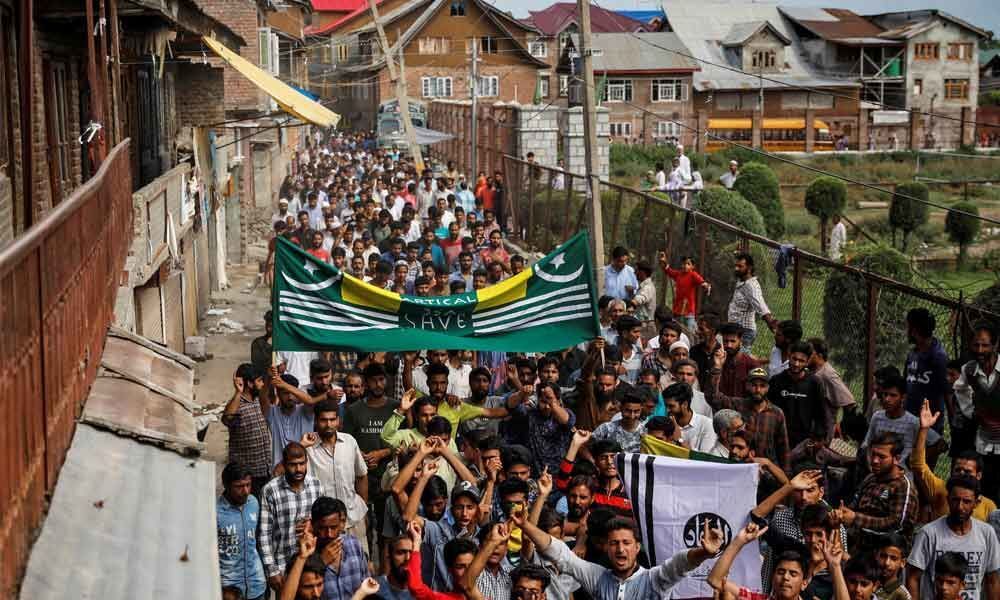Live
- Nortje ruled out of SA’s remaining white-ball matches against Pakistan
- Mamata doesn't want INDIA bloc to succeed, claims BJP's Rahul Sinha
- Air India Express cancels flights at Chennai airport due to deluge
- Kejriwal promises Rs 2,100 for Delhi women if AAP wins polls, BJP takes ‘lollipop’ jibe
- JPC Chairman supports Assam govt's 'No NRC, No Aadhaar,' rule
- Stoinis vows to revive Melbourne Stars’ glory with fresh leadership
- DDA easing freehold conversion of shops: MoS Sahu
- CP Sudheer Babu Updates on Manchu Family Cases
- Keerthy Suresh Marries Long-time Friend Antony Thattil in Goa
- Siddaramaiah govt defends police action on Panchamasali Lingayat protesters
Just In
Kashmir tensions spill over to UK's Pak, Indian communities


Ever since thousands of troops placed Indian-administered Kashmir in lockdown, Sohail Nasti has been sitting in the living room of his north London home frantically trying to communicate with his family.
London: Ever since thousands of troops placed Indian-administered Kashmir in lockdown, Sohail Nasti has been sitting in the living room of his north London home frantically trying to communicate with his family.
With all mobile phone networks, landlines and internet access cut off in the region, it has been impossible to establish how they are faring.
The best he has managed is to get through to a local police station via satellite phones being used by security forces.
"They just told me that everything is fine and that there's nothing to worry about. Kashmir is normal, they said, but from here in London it's anything but that," said Nasti.
As the head of a global charity, he has good reason to be concerned about the Himalayan state in which he was born, which again finds itself plunged into turmoil after the Indian government revoked its special status.
Known as Article 370, it stripped away the autonomy that Kashmir was granted in exchange for joining the Indian union after independence in 1947.
The move by Prime minister, Narendra Modi, has led to fears of widespread unrest and paralysed normal life as tens of thousands of extra troops and security personnel were dispatched to add to the estimated 500,000 already present, making it one of the world's most militarised zones.
Of the 1.1 million British Pakistanis, more than one million originate from the part of Kashmir governed by Pakistan.
While there are no official figures for the number of Indian Kashmiris in Britain, the overall British Indian community numbers almost 1.4 million and support for India's position is strong among some sections.
Wedged between India and Pakistan, Kashmir is divided between the two nations and bitterly contested by them. Both claim it as their own, have fought two wars over it and made it a volatile nuclear flashpoint, given their respective arsenals.
"It's a very sensitive issue for both communities and I'm worried that it could damage relations between the two. We have to make sure that whatever we do, it does not spill over into unrest or hatred between British Indians and Pakistanis," said Raja Sikander Khan, a London-based campaigner on Kashmir human rights.
A counter demonstration is scheduled by British supporters of India's ruling Bharatiya Janata party (BJP).
A number of other events are also set to take place to draw attention to the Kashmir issue over the coming weeks while leading British Pakistani politicians have written to the Foreign Office and the UN calling for action against India over its current actions.
Lord Nazir Ahmed, one of the signatories who originates from Pakistan-administered Kashmir said: "There is bound to be some heated debate between the two communities but we have to ensure that it remains just that.
"We are determined to put pressure on the international community because what India has done is illegal. But the solution is through peaceful dialogue, both between British Indians and Pakistanis and the respective governments of each country."
Forum president Krishna Bhan said: "We have the support of many British Indians, not just those who originate from Kashmir, and several parliamentarians.
I accept that things are a little tense between the British Indian and Pakistani communities at the moment but I'm confident that matters will settle down. Revoking article 370 will lead to a better future for Kashmir."

© 2024 Hyderabad Media House Limited/The Hans India. All rights reserved. Powered by hocalwire.com






